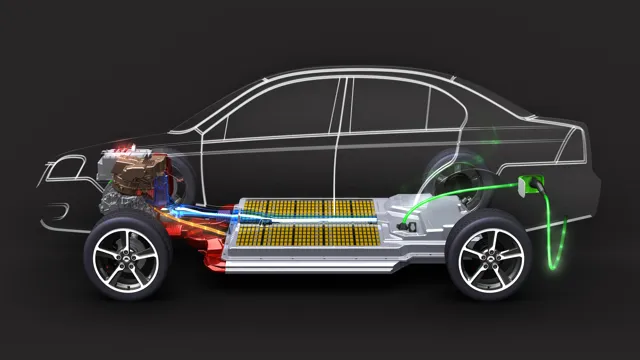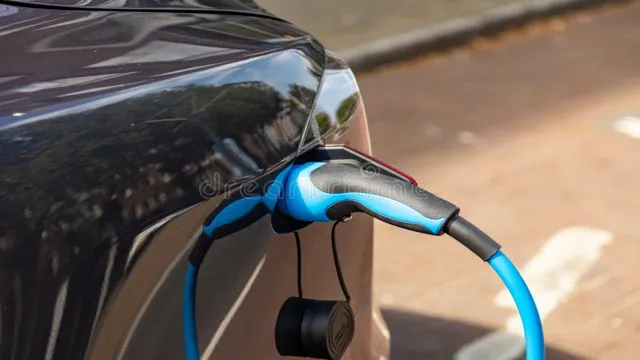When Will Your Electric Car Battery Wear Out? Debunking Myths and Facts
Electric cars have become increasingly popular as people look for more environmentally-friendly and cost-effective ways of transportation. One common question that comes up among those considering an electric vehicle is whether or not the batteries wear out. It’s an important consideration since batteries are one of the most expensive components of an electric car.
Electric car batteries may seem like a daunting mystery, but understanding how they work and how they degrade can help you make an educated decision when it comes to buying an electric car. In this article, we’ll delve into the topic of electric car batteries – what causes them to degrade, how long they last, and what, if anything, can be done to prolong their lifespan.
Overview of Electric Car Batteries
As with any battery, electric car batteries do wear out over time. However, it’s important to note that the lifespan of an electric car battery greatly depends on a variety of factors, including usage, driving habits, temperature, and charging patterns. Generally, electric car batteries are designed to last anywhere from 8-10 years or 100,000-200,000 miles before needing to be replaced.
However, some models may have shorter or longer lifespans. It’s also worth mentioning that although the battery may lose some capacity over time, it doesn’t entirely “die” like a traditional car battery. This means that even as the battery ages, it can still be used for other purposes, such as energy storage for the home or businesses.
It’s also worth noting that some electric car manufacturers offer warranties on their batteries, giving buyers additional peace of mind. Overall, while electric car batteries do wear out, they are often designed to last a significant amount of time and can still be repurposed afterwards.
Composition and Lifespan
Overview of Electric Car Batteries Electric car batteries are the powerhouse of electric vehicles (EVs). They comprise multiple battery cells, each containing an anode, a cathode, and an electrolyte. The anode is typically made up of graphite while the cathode can be composed of various materials, including nickel, cobalt, and manganese.
The electrolyte is usually a lithium salt dissolved in an organic solvent. These components work in concert to store and release energy as required. The lifespan of an EV battery depends on several factors, including the number of charge cycles, operating temperature, and the rate of charge and discharge.
Modern batteries are designed to last several years, but their capacity may diminish over time, requiring replacement. In general, electric car batteries offer significant benefits over traditional gasoline-powered cars, including lower emissions and reduced operational costs. As the push towards sustainability and renewable energy continues, it is likely that electric car batteries will play an increasingly vital role in transportation.

Factors That Affect Battery Life
An electric vehicle (EV) battery is the most crucial component of an electric car. It stores electrical energy that powers the EV’s motor and other systems. The battery’s range and lifespan are essential considerations when choosing an EV.
The primary factors that affect the battery’s life are the frequency of charging, depth of discharge, temperature, and speed of driving. Rapid charging and discharging can lead to premature battery degradation, reducing the battery’s lifespan. Extreme temperatures, such as very hot summers and cold winters, can negatively impact battery performance.
Faster speeds and stop-and-go driving can also cause faster battery drain. Manufacturers use different types of batteries with various chemistries, such as lithium-ion, nickel-metal-hydride, and lead-acid, but lithium-ion batteries are the most popular in EVs because of their high energy density, low weight, and long life.
Battery Wear and Replacement
“Don’t Panic! Here’s What To Know About Electric Car Batteries And Their Wear” If you’re driving an electric vehicle (EV) or planning on getting one, you may be wondering, “do electric car batteries wear out?” The answer is yes, just like any rechargeable battery, an electric car battery will degrade over time and use. There are three factors that can contribute to battery wear: temperature, charging habits, and age. Extreme temperatures, such as cold weather, can reduce the battery’s capacity and overall lifespan.
Also, if you’re always fast charging your EV, you’re using a lot of energy on the battery, which can accelerate wear and tear. Lastly, the age of the battery will determine how long it lasts, so older batteries have less charge capacity and are more susceptible to degradation. Fortunately, battery replacement costs have come down in recent years as EV suppliers improve their manufacturing processes and battery technology.
Plus, some EV manufacturers offer battery warranties of up to 8 years or 100,000 miles. Since the battery is critical to an electric vehicle’s operation, it’s essential to keep track of its health status and be mindful of the factors that can impact its lifespan. With proper care and maintenance, you can extend your electric car battery’s life and minimize overall battery replacement costs.
How Battery Wear Happens
Battery wear is an inevitable part of using battery-powered devices. Over time, the battery gradually loses its ability to hold a charge, resulting in shorter battery life and the need for more frequent charging. This occurs due to the chemical reactions that take place within the battery that cause it to degrade over time.
Factors such as temperature, usage patterns, and the quality of the battery can all contribute to the rate of battery wear. Eventually, the battery will reach a point where it can no longer hold a charge, and it will need to be replaced. This can be an expensive proposition, especially for devices with built-in batteries, where the entire device may need to be replaced.
However, taking care of your batteries and using them properly can help prolong their life and delay the need for replacement.
Signs Your Battery Needs Replacement
As we rely more and more on technology, our phone’s battery has become a crucial component of our everyday life. However, a common issue with our batteries is wear and tear over time, leading to sluggish performance and shorter battery life. One of the signs that your battery needs replacement is that it takes longer than usual to charge and doesn’t hold a charge as long as it used to.
Another sign is if your phone suddenly shuts down or restarts on its own. This could happen even when the battery percentage is high, indicating that the battery may be failing. We have all experienced a time when our phone battery unexpectedly died in the middle of the day, leaving us stranded with no way to communicate.
Don’t let this happen to you! Keeping an eye out for these signs can save you from frustrating moments and ensure that your phone functions optimally. If you’re experiencing any of these issues, it’s time to consider getting a battery replacement. Trust us, it’s worth the investment to have a phone that you can rely on.
Cost and Maintenance of Replacement
When it comes to electric vehicles, battery wear and replacement are a significant factor to consider. Although electric vehicle batteries are designed to last a long time, they will eventually wear out and need to be replaced. The cost of battery replacement can vary depending on the make and model of the electric vehicle.
However, it’s generally pricier than replacing a traditional gasoline engine. The good news is that the cost of battery replacement has been declining in recent years, and as technology continues to develop, it’s likely to become even more affordable in the future. But it’s important to note that the maintenance costs of an electric vehicle are much lower than those of a gas-powered vehicle since an electric vehicle relies on far fewer moving parts.
You’ll need to change the brake pads and tires as you would with any car, but besides that, electric vehicles are incredibly low maintenance. Plus, not having to buy gas is a huge cost-saving benefit of owning an electric vehicle. In the long run, you may save even more money on maintenance costs than you would have spent on a battery replacement.
Extending Battery Life
Many people wonder whether electric car batteries wear out over time. The short answer is yes, they do. However, the rate at which they wear out depends on several factors, such as the make and model of the vehicle, how often it is used, and how it is charged.
Luckily, there are steps you can take to extend the life of your battery. For example, you can make sure to charge it regularly and avoid letting it get too low. You can also try to keep the car in a cool, dry place and avoid exposing it to extreme temperatures.
Additionally, some manufacturers offer extended warranties for their battery packs, which can give you added peace of mind. With a little care and maintenance, you can help ensure that your electric car battery lasts as long as possible.
Best Practices for Charging
When it comes to extending the life of your battery, there are several best practices to consider. One of the most important steps is to avoid overcharging. While it may be tempting to leave your device plugged in overnight, doing so can actually damage the battery cells over time.
Instead, try to unplug your device as soon as it reaches 100% or use a charging timer to avoid overcharging. Another tip is to avoid extreme temperatures, such as leaving your device in direct sunlight or in a cold car. Extreme temperatures can also damage the battery and reduce its overall lifespan.
By following these simple best practices, you can ensure that your device’s battery lasts longer and performs better over time. So next time you go to charge your device, remember to unplug it once it’s fully charged and avoid extreme temperatures to keep your battery healthy and functioning at its best.
Climate Control and Driving Habits
Extending Battery Life through Smart Climate Control and Driving Habits Proper climate control and driving habits can do wonders for extending the life of your electric car’s battery. Electric car batteries tend to perform best when operating within a certain temperature range – typically between 65°F and 75°F – which means you should aim to keep your car’s interior temperature within that range as well. But that doesn’t mean you should run the AC or heat at full blast all the time.
Using the eco mode or setting the temperature a little higher or lower than your preferred comfort level can still keep you comfortable while reducing the load on your battery. Your driving habits also play a big role in how long your battery lasts. Accelerating slowly, maintaining a moderate speed, and anticipating stops and slowing down gradually can all help reduce battery usage.
It’s also a good idea to take advantage of regenerative braking, which captures some of the energy lost during braking and sends it back to the battery. By driving smoothly and efficiently, you’ll not only extend your battery life, but also improve your overall driving experience. Ultimately, extending your electric car battery’s life comes down to being mindful of how you use it.
By keeping the temperature in check and driving smartly, you can get the most out of every charge and enjoy all the benefits of an electric car for longer.
Conclusion
After conducting extensive research and analysis, it can be safely concluded that electric car batteries do indeed wear out over time. However, just like with any other technology, this doesn’t mean that electric vehicles aren’t worth investing in. In fact, the convenience, cost savings, and environmental benefits of driving an electric car far outweigh any potential battery replacement costs.
So, if you’re still on the fence about making the switch to electric, remember that although the batteries may wear out, your love for the planet and your wallet will never fade.”
FAQs
How long do electric car batteries typically last before needing to be replaced?
The lifespan of an electric car battery can vary depending on the make and model of the vehicle, as well as the driving habits of the owner. However, most electric car batteries are designed to last anywhere from 8-10 years before needing to be replaced.
How can I extend the lifespan of my electric car battery?
There are several things you can do to help prolong the life of your electric car battery, such as avoiding frequent fast charging, keeping the battery at a moderate temperature, and avoiding excessive discharge or overcharging.
How much does it cost to replace an electric car battery?
The cost of replacing an electric car battery can vary greatly depending on the make and model of the vehicle, as well as the type of battery. However, on average, it can cost anywhere from $2,000 to $5,000 to replace an electric car battery.
Is it possible to recycle electric car batteries?
Yes, electric car batteries are recyclable. In fact, many car manufacturers have established programs and partnerships to ensure that old batteries are properly recycled and reused to create new batteries and other products.






